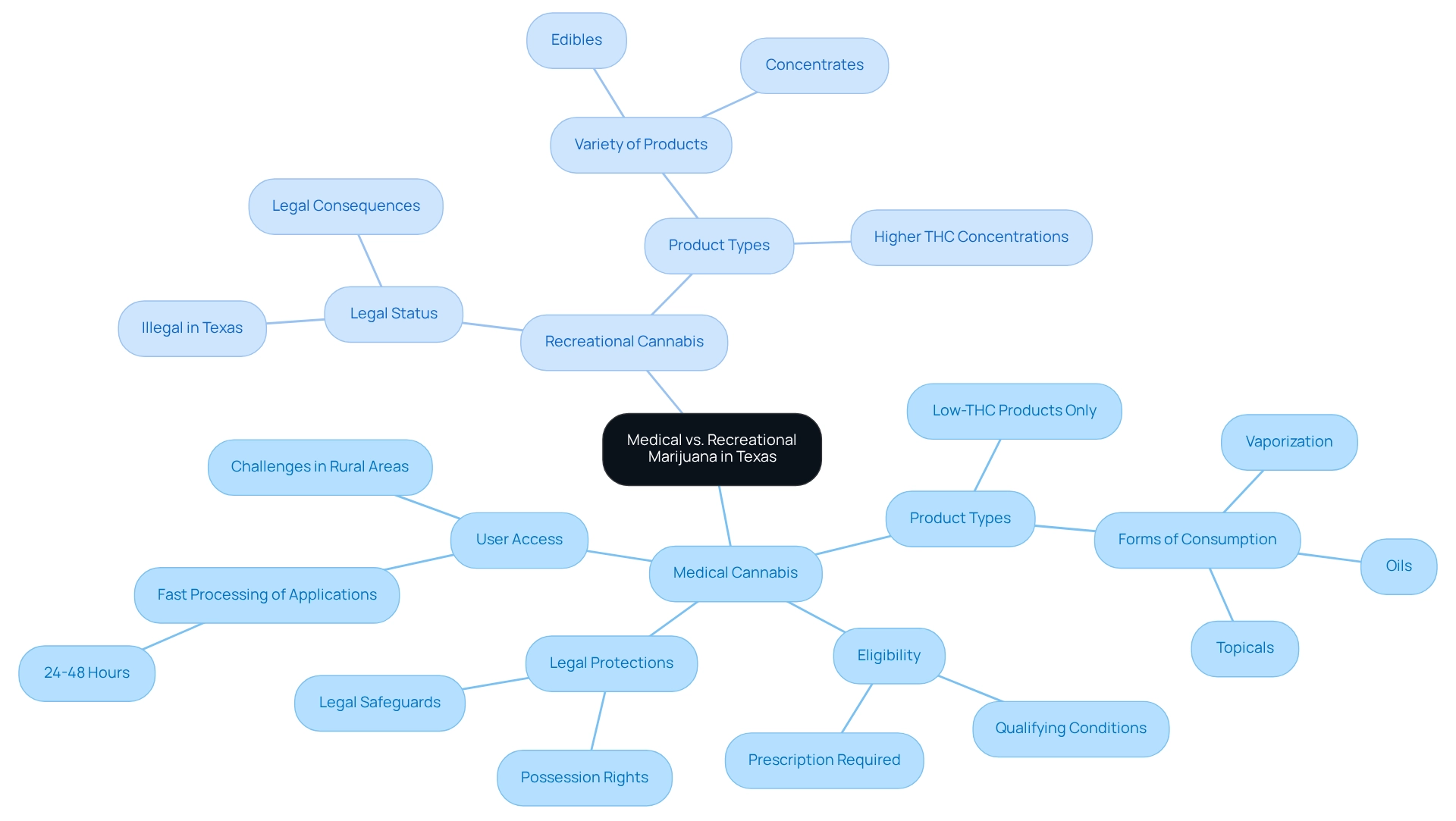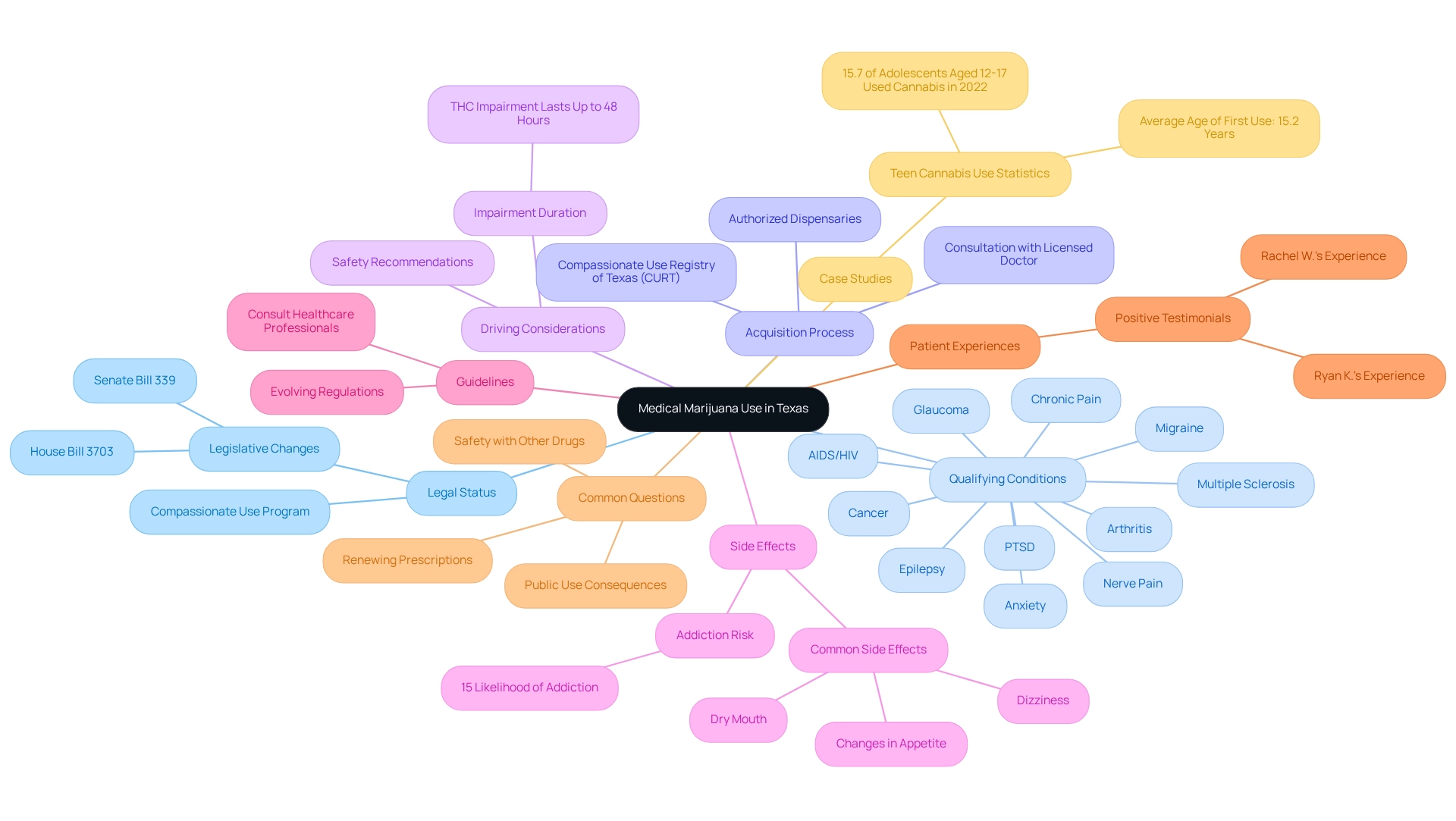Understanding Texas Medical Marijuanas Laws 2024: An In-Depth Tutorial
by Maya Green · April 10, 2025
Explore the evolving landscape of Texas medical marijuana laws in 2024, ensuring patient access and rights.

Overview
The article explores the evolving landscape of Texas medical marijuana laws in 2024, particularly focusing on the Compassionate Use Act and its significance for those seeking therapeutic cannabis. It’s important to recognize the struggles individuals may face while navigating these changes. Recent legislative updates aim to expand access to low-THC cannabis for a broader range of qualifying conditions, which can be a source of hope for many.
Moreover, improvements to the application process and an increase in the number of licensed dispensaries are designed to enhance patient care. This means that individuals can expect a more supportive environment, ultimately leading to better access to the resources they need. Platforms like Leafy DOC are here to facilitate this journey, providing guidance and support.
As you consider these changes, remember that you are not alone in this process. These developments are a step toward a more compassionate approach to healthcare, ensuring that those in need can find relief and support. Take the time to explore your options and reach out for assistance as you navigate this new landscape.
Introduction
In Texas, the landscape of medical marijuana is evolving rapidly, shaped by legislative changes and a growing acceptance of cannabis as a legitimate treatment option. The Compassionate Use Act, established in 2015, has expanded its reach, allowing patients with a range of qualifying conditions to access low-THC cannabis for relief. As of 2024, the state is actively refining its regulations to enhance patient access, with significant increases in the number of licensed dispensaries and a surge in patient enrollment.
This article delves into the intricacies of Texas’s medical marijuana laws, exploring the qualifying conditions and the application process for obtaining a medical marijuana card. It also highlights the critical differences between medical and recreational use, ensuring that you feel informed and supported in your journey. You may find it comforting to know that telehealth services, such as Leafy DOC, play a pivotal role in simplifying the process for patients seeking relief from chronic pain, anxiety, and other debilitating conditions.
With expert insights and personal patient stories, this exploration aims to illuminate the transformative impact of medical cannabis in Texas. Together, we can look forward to a promising future that lies ahead, where compassionate care and understanding are at the forefront of this evolving landscape.
Overview of Medical Marijuana Legislation in Texas
In Texas, the legal framework governing cannabis use is primarily shaped by the Compassionate Use Act, enacted in 2015. This crucial law allows the prescription of low-THC marijuana to individuals diagnosed with particular health conditions, such as epilepsy, multiple sclerosis, and terminal cancer. Over the years, the Act has experienced substantial revisions, broadening the list of qualifying conditions and expanding the variety of accessible marijuana products.
Starting in 2024, the state is actively improving its regulatory strategy according to Texas medical marijuana laws to increase access for individuals while ensuring essential oversight. It’s important to remember that these changes are designed to support those who need relief, making the process of obtaining cannabis more accessible.
Recent revisions to the Compassionate Use Act indicate a rising acknowledgment of the therapeutic potential of cannabis. Significantly, the Texas medical marijuana laws introduced modifications designed to streamline the application process for individuals and enhance the number of licensed dispensaries throughout the state. This development is essential for individuals seeking relief, as it outlines the legal limits within which they can function and obtain necessary therapies.
Current statistics show a significant rise in enrollment, with Texas reporting over 102,000 active users of cannabis by December 2025. This increase highlights the significance of the Compassionate Use Act in enhancing access to cannabis for individuals experiencing chronic pain, anxiety, PTSD, and other qualifying conditions. You may find that this growing acceptance reflects a broader understanding of the need for compassionate care.
Leafy DOC plays an important role in this context by concentrating on quick approvals and extensive support for individuals navigating the cannabis process. The platform streamlines the process for obtaining cannabis cards, enabling individuals to schedule appointments and obtain certifications from home, which is especially advantageous for those with mobility challenges or those residing in remote locations. With over 40,000 individuals empowered by Leafy DOC, the service exemplifies client-centered care through its secure and efficient telehealth solutions.
A case study of Leafy DOC illustrates its effectiveness: the platform has enhanced the quality of life for users by providing a user-friendly interface for consultations and quick approval times for cannabis applications. This addresses the challenges encountered by individuals in accessing qualified healthcare providers. Personal narratives from individuals emphasize the transformative effect of therapeutic marijuana, with many noting enhanced quality of life, decreased dependence on prescription medications, and improved symptom management.
Expert insights on the Compassionate Use Act underscore its beneficial influence on access for individuals. Legal specialists highlight that the Act has greatly enhanced the situation for therapeutic marijuana in Texas, enabling individuals to acquire essential assessments and certifications more effectively. The ongoing discussions regarding potential reclassification of the substance from Schedule I to Schedule III under the Controlled Substances Act further indicate a shift towards broader acceptance of therapeutic use, aligning with the views of health authorities regarding its therapeutic application and lower potential for abuse.
In summary, the Compassionate Use Act remains a cornerstone of Texas’s legislation on medicinal use, continually adapting to meet the needs of individuals while ensuring regulatory compliance. Comprehending these regulations is crucial for individuals navigating the complexities of obtaining cannabis for therapeutic purposes, as they offer a clear structure for accessing the care required. Furthermore, possessing a cannabis prescription provides legal safeguards under state regulations, access to quality products, and possible tax advantages, making Leafy DOC a crucial ally in this journey.
Qualifying Conditions for Medical Marijuana in Texas
In Texas, individuals facing certain health challenges may find hope in cannabis as a treatment option. Conditions such as:
- Epilepsy
- Multiple sclerosis
- Spasticity
- Amyotrophic lateral sclerosis (ALS)
- Autism
- Terminal cancer
- Other debilitating ailments, as determined by a physician
qualify individuals for this therapy. As we look ahead to 2024, the Texas medical marijuana laws have expanded the list of qualifying conditions, reflecting ongoing research and advocacy efforts aimed at improving access to therapeutic marijuana for those in need. This evolution is a testament to the growing acknowledgment of cannabis’s therapeutic potential in addressing various health concerns.
It’s encouraging to note that, as of December 2025, Texas reported 102,597 active users of therapeutic substances. This figure underscores the increasing acceptance and use of medicinal herb in the state.
To obtain a cannabis card, individuals must consult with a licensed doctor who can assess their condition. This assessment is crucial, as it allows the doctor to determine whether therapeutic marijuana is a suitable treatment choice based on the individual’s specific health needs. In Texas, many patients are grappling with chronic pain and other qualifying conditions, often seeking alternative therapies to manage their symptoms effectively.
Ongoing studies continue to explore the effectiveness of marijuana in addressing various health issues, reinforcing its role in pain control and symptom alleviation. The National Academies of Sciences, Engineering, and Medicine emphasize the need for more effective federal leadership and a comprehensive research agenda to mitigate public health risks while maximizing the benefits of marijuana. Testimonials from individuals highlight the positive effects of cannabis on their quality of life, particularly for those dealing with chronic pain, anxiety, and other eligible conditions.
For instance, many individuals have shared transformative experiences with Leafy DOC, praising the convenience and efficiency of the telehealth services that facilitate access to therapeutic marijuana. One individual expressed, ‘The whole process was so quick and easy.’ They appreciated how responsive the team was, keeping them informed every step of the way.
Leafy DOC represents a significant advancement for cannabis users! Additionally, platforms like Leafy DOC assist individuals in navigating the process of obtaining a health-related cannabis card, enhancing accessibility, especially for disabled individuals who may find it challenging to visit a doctor’s office. As the landscape of therapeutic cannabis in Texas evolves, it remains essential for individuals to stay informed about the Texas medical marijuana laws and the treatment options available to them.
Step-by-Step Guide to Applying for a Medical Marijuana Card
To apply for a cannabis marijuana card in Texas, it’s important to follow these essential steps with care:
-
Determine Eligibility: First, confirm that you have a qualifying condition recognized by Texas law, such as chronic pain, anxiety, or PTSD. Common qualifying conditions include:
- AIDS
- HIV
- Arthritis
- Cancer
- Chronic pain
- Epilepsy
- Glaucoma
- Migraine
- Multiple Sclerosis
- Nerve Pain
- PTSD
-
Consult a Registered Physician: Schedule an appointment with a physician who is registered with the Compassionate Use Registry of Texas (CURT). Many patients find it convenient to utilize telehealth services offered by Leafy DOC for this consultation, allowing for a seamless experience from home. To book your appointment:
- Submit an intake form with your personal details and ID.
- Connect with the right doctor via phone call or video.
-
Obtain a Prescription: If the physician determines that cannabis is suitable for your condition, they will issue a prescription for low-THC cannabis. Sign up with CURT: The doctor will input your details into the CURT system, which is an essential step for acquiring your cannabis card. Visit a Dispensary: After registration, you can visit a licensed dispensary to purchase your prescribed products. Remember to bring your identification and any required paperwork to ensure a smooth transaction.
In Texas, numerous applications for therapeutic cannabis cards are processed within 24-48 hours, allowing individuals to access their medications quickly. This efficient process is designed to minimize barriers to access, particularly for those who may face challenges due to mobility issues or living in rural areas. By leveraging telehealth consultations, Leafy DOC enhances the patient experience, ensuring that individuals receive the expert guidance they need throughout the application process while maintaining the privacy of their personal information.
Moreover, grasping the legal framework regarding cannabis for health purposes is essential, especially in light of the Texas medical marijuana laws 2024. Numerous studies highlight the obstacles to accessing therapeutic cannabis in the USA, emphasizing the important role Leafy DOC plays in addressing these issues. Furthermore, it’s important to note that some states accept out-of-state health cards, while others do not; reviewing your state page for a complete list can provide clarity if your state recognizes out-of-state cards.
Understanding Penalties for Marijuana Possession in Texas
In Texas, cannabis possession remains unlawful unless an individual is a registered therapeutic cannabis user. Understanding the penalties for possession is crucial, especially for those who rely on cannabis for their health. The penalties are categorized based on the amount of marijuana involved:
- Possession of 2 ounces or less: This is classified as a Class B misdemeanor, which can lead to up to 180 days in jail and a fine reaching $2,000.
- Possession of 2 to 4 ounces: This is viewed as a Class A misdemeanor, carrying potential penalties of up to one year in jail and fines up to $4,000.
- Possession of larger amounts: Such cases can escalate to felony charges, resulting in severe consequences, including significant jail time and hefty fines.
It’s important to remember that grasping these penalties can help individuals using therapeutic marijuana navigate the legal framework effectively and avoid potential issues. Leafy DOC simplifies access to medical cannabis through telehealth services and patient education, providing expert guidance throughout the application process while ensuring the privacy of personal information—something vital for patients facing these legal challenges.
Recent statistics highlight that cannabis possession arrests in Texas continue to be a contentious issue, with thousands facing legal repercussions each year. In 2022, over 60,000 arrests related to cannabis possession were recorded, underscoring the ongoing challenges within the state’s legal framework.
The legal repercussions of marijuana possession can significantly impact individuals with health issues, particularly those who depend on it for chronic pain relief or other qualifying ailments. Understanding these complexities is essential to ensure compliance and safeguard against unintended legal issues. Many experts believe that the current penalties may disproportionately affect patients, who often face scrutiny despite their legal status.
Legal specialists advocate for changes to create a fairer system that acknowledges the necessity of cannabis use. Benjamin Brock, a founding attorney, emphasizes, “If you’re facing a marijuana-related charge, contact us today,” highlighting the importance of legal support in navigating these challenges.
In light of ongoing legislative efforts, including bills introduced in 2023 aimed at amending the Texas Constitution to allow broader cannabis use, the landscape of Texas medical marijuana laws in 2024 is evolving significantly. These discussions suggest a rising trend towards reform, which could have implications for both therapeutic and recreational use in the near future.
As the state navigates these changes, it’s crucial for individuals to stay informed about the legal implications of cannabis possession under the Texas medical marijuana laws in 2024 and the developing regulatory landscape. Additionally, numerous requests for therapeutic cannabis permits are processed within 24-48 hours, enabling individuals to obtain legal status efficiently and receive the care they need. Medical marijuana is enhancing lives across the United States, with many individuals suffering from chronic pain reporting improved quality of life and a preference for marijuana over opioids due to its efficacy and lower risk of addiction.
Medical vs. Recreational Marijuana: Key Differences in Texas Law
In Texas, the regulation of cannabis for therapeutic use is governed by the Compassionate Use Program. This program allows only low-THC cannabis for individuals diagnosed with specific qualifying conditions. Unfortunately, recreational cannabis remains illegal in the state, creating a significant distinction between therapeutic and recreational cannabis regulations.
Eligibility: To access therapeutic cannabis, individuals must obtain a prescription from a registered doctor who is part of the Compassionate Use Program. This requirement emphasizes the clinical aspect of the program, in contrast to recreational use, which is not legally acknowledged in Texas. You may find that telehealth services provided by Leafy DOC can simplify this process, offering guidance and support as you navigate the application process.
Product Types: Medical cannabis in Texas is restricted to low-THC products, limiting the potency available to individuals. In contrast, states with recreational regulations usually permit elevated THC concentrations and a wider variety of product categories, including edibles and concentrates.
Legal Protections: Patients registered in the therapeutic program gain certain legal safeguards, such as the right to possess prescribed quantities of the herb. On the other hand, those pursuing recreational use encounter legal consequences, highlighting the risks associated with non-medical cannabis consumption.
Moreover, crime laboratories have indicated a need for new testing tools to distinguish between hemp and cannabis, which is essential for upholding these legal differences.
The impact of these regulations on user access is considerable. For instance, numerous requests for therapeutic cannabis cards are handled within 24-48 hours, enabling faster access to essential treatments. However, the stringent requirements can still pose challenges for individuals, particularly those in rural areas who may struggle to find registered physicians.
Personal narratives from patients across the United States demonstrate how therapeutic products are enhancing lives. Many chronic pain sufferers indicate an improved quality of life and a preference for this alternative over opioids due to its reduced addiction risk.
Expert perspectives reveal that the variations between therapeutic and recreational regulations in Texas reflect broader societal views on these substances. The FDA has observed that delta-8 possesses psychoactive and intoxicating effects; however, it is typically less powerful than delta-9, further highlighting the intricacies of product regulation. Comparatively, West Virginia’s therapeutic plant program encompasses conditions such as amyotrophic lateral sclerosis, cancer, Crohn’s disease, and PTSD, among others.
This comparison emphasizes the differing range of qualifying criteria among states and the potential for greater access to therapeutic cannabis. Case studies from other states, like Pennsylvania, demonstrate the possible advantages of a well-organized cannabis program. Pennsylvania’s strategy has increased the availability of marijuana for issues such as chronic pain and PTSD, enhancing treatment choices for individuals.
This comparison highlights the significance of careful regulation in improving care and access to therapeutic substances in Texas.
Overall, understanding the subtleties of Texas laws regarding these products is vital for individuals seeking relief. The legal framework directly affects their ability to obtain and use these therapeutic items.
Accessing Medical Marijuana: Dispensaries and Products in Texas
In Texas, individuals seeking therapeutic cannabis often face challenges in accessing the right products. Fortunately, they can acquire these from authorized dispensaries involved in the Compassionate Use Program. You can easily locate these dispensaries through the Compassionate Use Registry of Texas (CURT) system or by conducting online searches. The range of available products includes:
- Tinctures: These liquid extracts can be administered sublingually, allowing for quick absorption into the bloodstream, which many find beneficial.
- Oils: Concentrated cannabis oils provide flexibility in usage, catering to various preferences and needs.
- Capsules: Pre-measured doses in capsule form offer a convenient and discreet method of consumption, making it easier to manage your intake.
- Edibles: Food products infused with low-THC cannabis are perfect for those who prefer a more palatable option.
It’s important to remember that consulting with a prescribing physician is essential to identify the most suitable product for your specific needs. This ensures that you are not only choosing the appropriate kind of cannabis but also purchasing from a licensed supplier, thus complying with Texas regulations. As of 2024, the number of licensed cannabis dispensaries in Texas is on the rise, reflecting a significant increase in consumer access and product availability due to the Texas medical marijuana laws.
This expansion is further supported by the growing number of therapeutic cannabis users, with January 2025 demonstrating a notable rise compared to prior years. According to the Pew Research Center, 88% of U.S. adults believe that cannabis should be legal, whether for recreational and therapeutic use or for therapeutic use only. This indicates a strong societal shift towards acceptance, which is encouraging.
The COVID-19 pandemic has also influenced the landscape, prompting many Texas dispensaries to adopt delivery services. This ensures that individuals maintain access to their treatments amidst health concerns. Leafy DOC plays an essential role in this process by enabling access to cannabis through its telehealth services, especially for individuals in rural regions or those with mobility challenges. By utilizing these resources, you can manage the intricacies of acquiring cannabis more efficiently.
Moreover, numerous applications for therapeutic cannabis cards are handled within 24-48 hours, further improving the efficiency of obtaining these essential products. Remember, you are not alone in this journey, and there are resources available to help you navigate your options.
Recent Legislative Changes and Future Outlook for Medical Marijuana in Texas
Recent legislative changes related to the Texas medical marijuana laws 2024 have significantly aimed to improve access to cannabis for individuals in need. Senate Bill 1505, in particular, seeks to expand the number of licensed dispensaries, enhancing the accessibility of therapeutic products. This bill also suggests broadening the variety of items available, which is essential for those with diverse health requirements.
It’s important to recognize that ongoing conversations about the legalization of recreational marijuana reflect a significant shift in public sentiment, indicating a rising acceptance of its use in Texas. The future perspective for medical marijuana in Texas appears progressively hopeful with the Texas medical marijuana laws 2024. Advocacy efforts are gaining momentum, with many stakeholders pushing for reforms that could further enhance access and rights for individuals. For instance, the Texas Compassionate Use Program currently allows physicians to prescribe low-THC cannabis for specific conditions such as epilepsy, multiple sclerosis, autism, cancer, and PTSD.
You may find that there is a strong push from advocates to broaden the list of qualifying conditions, enabling more patients to benefit from therapeutic cannabis. Public support for expanding access is evident, with many Texans advocating for legislative changes that would simplify the process of obtaining therapeutic cannabis cards. Numerous requests for cannabis cards are handled within 24-48 hours, emphasizing the effectiveness of the application procedure.
After certification, individuals must register with the state to receive their marijuana card, which can be easily downloaded or mailed. This efficient procedure is crucial for those seeking prompt access to therapeutic marijuana, especially individuals enduring chronic pain, anxiety, and other debilitating ailments.
The anticipated effect of Senate Bill 1505 on individual access is substantial, particularly with the implementation of the Texas medical marijuana laws 2024, as it aims to simplify the distribution of therapeutic marijuana and ensure that individuals can readily acquire the products they require. The Department of Public Safety plays an essential role in regulating the use of such products in Texas and manages the Compassionate Use Registry to ensure adherence to state law.
As Texas continues to navigate the complexities of cannabis legislation, expert opinions suggest that the state is on the brink of significant changes that could reshape the landscape of therapeutic access. Personal narratives from individuals, including veterans with PTSD and individuals undergoing cancer treatment, illustrate the profound impact of cannabis on quality of life. Texas Agriculture Commissioner Sid Miller has shared his vision for the future of therapeutic cannabis, emphasizing the necessity for ongoing reform.
With ongoing legislative discussions and a supportive public sentiment, the future of therapeutic cannabis in Texas, particularly under the Texas medical marijuana laws 2024, is poised for growth and enhancement, ultimately benefiting individuals across the state. Furthermore, Leafy Doc’s online platform plays a crucial role in improving access to cannabis by offering telehealth services and educational resources, ensuring that individuals can navigate the application process effectively and receive the support they require.
Frequently Asked Questions About Medical Marijuana Use in Texas
Here are some frequently asked questions regarding medical marijuana use in Texas:
-
Is medical marijuana legal in Texas? Yes, therapeutic cannabis is permitted for individuals with qualifying conditions under the Compassionate Use Program, which has developed to encompass a wider variety of ailments since its beginning.
-
What are some qualifying conditions for a Medical Marijuana Card? Patients may qualify for a Medical Marijuana Card if they suffer from conditions such as AIDS/HIV, anxiety, arthritis, cancer, chronic pain, epilepsy, glaucoma, migraine, multiple sclerosis, nerve pain, and PTSD. This detailed list assists individuals in determining if they could qualify for medical treatment.
-
How do I acquire therapeutic cannabis? To obtain low-THC herb, individuals must meet with a licensed doctor who can recommend it. After this consultation, the doctor will enroll the patient in the Compassionate Use Registry of Texas (CURT), allowing them to buy therapeutic marijuana from authorized dispensaries.
-
Can I use medical marijuana while driving? It is highly recommended to refrain from driving while impaired by any marijuana product. THC impairment can last up to 48 hours, which may significantly affect your ability to operate a vehicle safely. It’s important to remember the significance of comprehending the impacts of marijuana on your body before participating in activities that demand complete focus.
-
What are the side effects of therapeutic cannabis? Common side effects include dizziness, dry mouth, and changes in appetite. A study indicates that approximately 15% of regular marijuana users may develop an addiction, highlighting the importance of discussing potential side effects and personal health history with a physician before use.
-
What are the guidelines for cannabis use according to Texas medical marijuana laws 2024? The guidelines continue to evolve in accordance with the Texas medical marijuana laws 2024, with recent legislative changes, including Senate Bill 339 and House Bill 3703, aimed at expanding access and refining the regulations surrounding low-THC cannabis. Patients should stay informed about updates to the Compassionate Use Program and consult healthcare professionals for the latest information.
-
What are some experiences of individuals regarding the legality of cannabis in Texas? Many individuals report favorable results from utilizing therapeutic cannabis, especially for issues like chronic pain and anxiety. Testimonials from Leafy DOC patients highlight the efficiency and compassion of the service. For instance, Ryan K. shared, “I was able to talk to a doctor and complete the entire process in less than an hour! The efficiency of this service is unparalleled.” Rachel W. expressed, “I had tried everything for pain relief before, and this service changed my life. The doctor understood my needs and helped me make an informed decision.” Such experiences underscore the importance of having access to licensed healthcare providers like Leafy DOC who can guide them through the process and ensure they receive appropriate care.
-
What are some commonly asked questions regarding therapeutic cannabis use in Texas? Patients frequently ask about the safety of utilizing therapeutic substances with other drugs, the procedure for renewing prescriptions, and the consequences of using such products in public areas. Addressing these questions with healthcare professionals can provide clarity and ensure safe practices.
-
What case studies demonstrate the application of cannabis in Texas? Recent surveys indicate that the average age of first cannabis use in Texas is notably lower at 15.2 years, with 15.7% of adolescents aged 12 to 17 using it in 2022. This highlights the necessity for responsible use and education regarding therapeutic cannabis, particularly for younger groups.
By addressing these common inquiries, patients can better navigate the complexities of medical marijuana use in Texas and make informed decisions about their health.
Conclusion
The evolving landscape of medical marijuana in Texas, shaped by the Compassionate Use Act, highlights a significant shift towards broader acceptance and accessibility of cannabis for therapeutic use. As more qualifying conditions expand and the application process becomes simpler, countless patients are finding the relief they so desperately need. The increase in licensed dispensaries and the vital role of telehealth services, such as Leafy DOC, further enhance patient experiences, making the journey toward obtaining a medical marijuana card more efficient and user-friendly.
It’s important to understand the distinct differences between medical and recreational marijuana laws. While medical cannabis is accessible under specific regulations, recreational use remains illegal. This emphasizes the necessity of navigating these legal frameworks carefully. The penalties for marijuana possession serve as a reminder for patients to stay informed about their rights and responsibilities within the medical cannabis program.
As Texas continues to refine its medical marijuana policies, the future looks promising. Advocacy efforts are gaining momentum, and public support for expanding access to medical cannabis is growing. Legislative changes, such as those proposed in Senate Bill 1505, aim to improve patient access and product availability, reflecting a commitment to compassionate care.
In summary, the transformation of medical marijuana laws in Texas not only provides hope for patients seeking alternative treatments but also signifies a broader societal shift towards recognizing the therapeutic potential of cannabis. By staying informed and utilizing resources like Leafy DOC, you can navigate this evolving landscape with confidence, ensuring you receive the care and support you need for a better quality of life.
Frequently Asked Questions
What is the Compassionate Use Act in Texas?
The Compassionate Use Act, enacted in 2015, allows the prescription of low-THC marijuana to individuals diagnosed with specific health conditions, such as epilepsy, multiple sclerosis, and terminal cancer.
What changes have been made to the Compassionate Use Act over the years?
The Act has undergone substantial revisions that have broadened the list of qualifying conditions and expanded the variety of accessible marijuana products.
How is Texas improving its medical marijuana laws starting in 2024?
Texas is enhancing its regulatory strategy to increase access to medical marijuana for individuals while ensuring necessary oversight.
What are the qualifying conditions for cannabis therapy in Texas?
Qualifying conditions include epilepsy, multiple sclerosis, spasticity, amyotrophic lateral sclerosis (ALS), autism, terminal cancer, and other debilitating ailments as determined by a physician.
How many active cannabis users were reported in Texas by December 2025?
Texas reported over 102,000 active users of cannabis by December 2025.
What role does Leafy DOC play in the cannabis process in Texas?
Leafy DOC focuses on quick approvals and extensive support for individuals navigating the cannabis process, streamlining the application for cannabis cards and offering telehealth solutions.
How has Leafy DOC impacted users’ experiences?
Leafy DOC has enhanced the quality of life for users by providing a user-friendly interface for consultations and quick approval times for cannabis applications.
What do legal specialists say about the Compassionate Use Act?
Legal specialists highlight that the Act has significantly improved access to therapeutic marijuana in Texas, making it easier for individuals to acquire necessary assessments and certifications.
What is the significance of the potential reclassification of cannabis under the Controlled Substances Act?
The ongoing discussions about reclassifying cannabis from Schedule I to Schedule III indicate a shift towards broader acceptance of its therapeutic use and recognition of its lower potential for abuse.
Why is understanding Texas medical marijuana laws important for individuals?
Understanding these regulations is crucial for navigating the complexities of obtaining cannabis for therapeutic purposes, as they provide a clear structure for accessing necessary care and legal protections.
Last Updated: July 9, 2025
Get Approved for Your Medical Marijuana Card in Minutes!

Get Your Medical Card
Connect with a licensed physician online in minutes

Like This Article?
Share with your friends
Table of Contents
Keep Reading
-
Understanding Cannabis Consumption Patterns: Trends And Insights
Discover the latest trends and insights in cannabis consumption patterns! Dive into the data driving the evolving landscape of marijuana use. Stay informed and explore more in-depth analysis on cannabis consumption today!
-
The Best Job Boards For Cannabis Industry Jobs
Looking for your dream job in the cannabis industry? Explore the best job boards to find the perfect opportunity for you. Start your career journey today and land that ideal role!
-
Navigating the Medical Marijuana Registry Ohio: A Complete Guide
Explore the essential steps and insights on the medical marijuana registry in Ohio.





